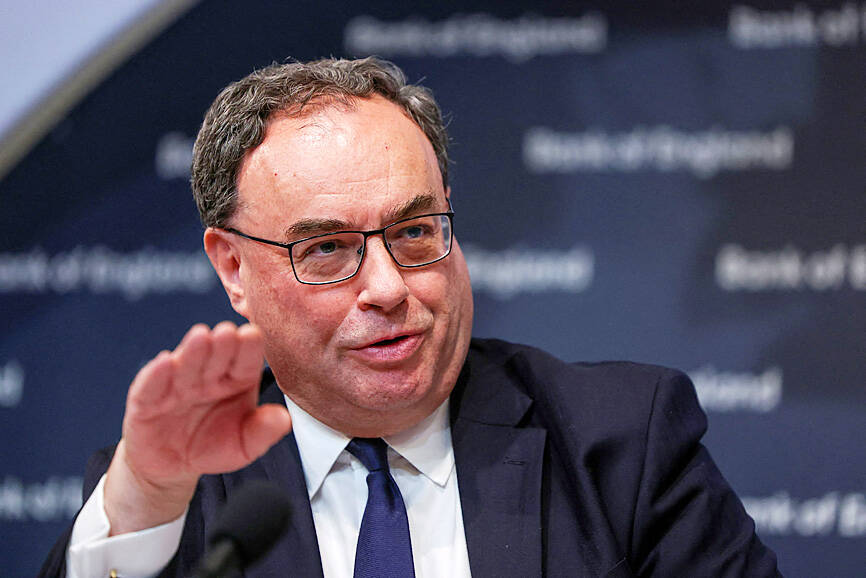Bank of England (BOE) Governor Andrew Bailey rejected the need for an inflation target higher than 2 percent, warning that changing the goal would “unpick expectations.”
He told a conference in Aix-en-Provence in France that the BOE has flexibility built into its remit that can give the central bank longer to bring price growth down, but that it was “critical that flexibility isn’t confused with not pursuing 2 percent.”
The BOE is grappling with inflation at 8.7 percent, over four times its remit. It raised rates by a surprise half point to 5 percent last month. Markets now expect it to increase them to 6.5 percent to prevent a wage-price spiral.

Photo: Reuters
Some economists have suggested raising the inflation target to 3 percent to take immediate pressure off central banks and avert a rate-induced slump. If the BOE lifts its benchmark to 6.5 percent, most economists believe a recession will be inevitable.
Bailey conceded that the problems were “more severe in the UK” than in Europe, but insisted: “We will bring inflation back to target,” and that “we do have some flexibility about how quickly we bring it back to target.”
Meanwhile, the European Central Bank (ECB) is nearly finished raising interest rates, but will then keep them at a “high plateau” to ensure they fully impact the economy, Governing Council member Francois Villeroy de Galhau said.
“In the euro area, I believe we will soon reach the high point of interest rates,” Villeroy said at the annual Aix-en-Provence conference. “But when I say high point this isn’t a peak, rather it will be a high plateau, on which we will have to remain for a sufficiently long time to fully transmit all the effects of monetary policy.”

The US dollar was trading at NT$29.7 at 10am today on the Taipei Foreign Exchange, as the New Taiwan dollar gained NT$1.364 from the previous close last week. The NT dollar continued to rise today, after surging 3.07 percent on Friday. After opening at NT$30.91, the NT dollar gained more than NT$1 in just 15 minutes, briefly passing the NT$30 mark. Before the US Department of the Treasury's semi-annual currency report came out, expectations that the NT dollar would keep rising were already building. The NT dollar on Friday closed at NT$31.064, up by NT$0.953 — a 3.07 percent single-day gain. Today,

‘SHORT TERM’: The local currency would likely remain strong in the near term, driven by anticipated US trade pressure, capital inflows and expectations of a US Fed rate cut The US dollar is expected to fall below NT$30 in the near term, as traders anticipate increased pressure from Washington for Taiwan to allow the New Taiwan dollar to appreciate, Cathay United Bank (國泰世華銀行) chief economist Lin Chi-chao (林啟超) said. Following a sharp drop in the greenback against the NT dollar on Friday, Lin told the Central News Agency that the local currency is likely to remain strong in the short term, driven in part by market psychology surrounding anticipated US policy pressure. On Friday, the US dollar fell NT$0.953, or 3.07 percent, closing at NT$31.064 — its lowest level since Jan.

Hong Kong authorities ramped up sales of the local dollar as the greenback’s slide threatened the foreign-exchange peg. The Hong Kong Monetary Authority (HKMA) sold a record HK$60.5 billion (US$7.8 billion) of the city’s currency, according to an alert sent on its Bloomberg page yesterday in Asia, after it tested the upper end of its trading band. That added to the HK$56.1 billion of sales versus the greenback since Friday. The rapid intervention signals efforts from the city’s authorities to limit the local currency’s moves within its HK$7.75 to HK$7.85 per US dollar trading band. Heavy sales of the local dollar by

The Financial Supervisory Commission (FSC) yesterday met with some of the nation’s largest insurance companies as a skyrocketing New Taiwan dollar piles pressure on their hundreds of billions of dollars in US bond investments. The commission has asked some life insurance firms, among the biggest Asian holders of US debt, to discuss how the rapidly strengthening NT dollar has impacted their operations, people familiar with the matter said. The meeting took place as the NT dollar jumped as much as 5 percent yesterday, its biggest intraday gain in more than three decades. The local currency surged as exporters rushed to